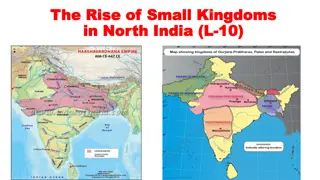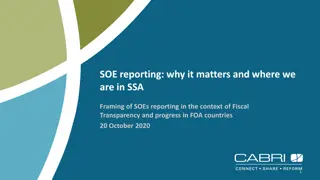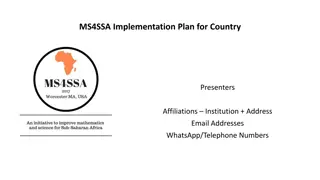Sub-Saharan Kingdoms of Ghana and Mali: Rise and Fall
The Sub-Saharan Kingdoms of Ghana and Mali were powerful empires in Western Africa, known for their wealth in gold and salt trade. Ghana emerged in 500 A.D. as the first great traders in West Africa, with strong rulers and a well-trained army. The empire of Ghana controlled all gold trade and had a government-controlled economy, but eventually fell due to invasion. Mali, ruled by notable figures such as Sundiata and Mansa Musa, defeated Ghana and extended its empire from the Atlantic Coast to Timbuktu, thriving on the trade of gold and salt. Each village had its ruler who sent tributes to the king of Mali.
Download Presentation

Please find below an Image/Link to download the presentation.
The content on the website is provided AS IS for your information and personal use only. It may not be sold, licensed, or shared on other websites without obtaining consent from the author.If you encounter any issues during the download, it is possible that the publisher has removed the file from their server.
You are allowed to download the files provided on this website for personal or commercial use, subject to the condition that they are used lawfully. All files are the property of their respective owners.
The content on the website is provided AS IS for your information and personal use only. It may not be sold, licensed, or shared on other websites without obtaining consent from the author.
E N D
Presentation Transcript
The West African Empires Ghana - 500 - 1200
Kingdom of Ghana Western Africa, located on the Senegal River Emerged in 500 A.D. 1st Great Traders of West Africa Gold and Salt trade Farming communities throughout nation Strong rulers, no laws to govern with Rulers acted as religious leader, judge, and military commander as well Well trained army to protect Kingdom Vast wealth- resources of gold, silver, and iron ore
Kingdom of Ghana Traded gold and salt but also cloth and weapons Berbers- traders whom carried the products across the desert Camels used About 3 miles per hours, about 60 days to reach destination Spread of Islamic ideas through trade Literacy grew- study of the Qu ran
Empire of Ghana King collected taxes on all goods traded Usually took tax payments as gold or salt blocks King controlled/ owned all gold Preventing it from losing its value at market Type of economy- Government Controlled! Elaborate dress for the wealthy 800 A.D.- reached empire status Smaller rulers left in place over territories Like a bureaucracy Independent rulers pay tax = freedom of state
End of Ghana Lived in luxury for hundreds of years Weakened by war Collapsed in the 1200 s Invasion
Mali - 1200 - 1464 Rulers- Sundiata, Mansa Musa
Kingdom of Mali 12th Century Defeated Ghana, captured capital 1240 Extended from Atlantic Coast to Timbuktu Wealth came from gold and salt trade Each village had its own ruler Ruler governed and sent money to the king of Mali
Mansa Musa Powerful king, 1312- 1337 Extended kingdom (double the size) Strong central govt., kingdom divided into provinces Timbuktu- Islamic learning center Pilgrimage to Mecca, wanted education in Mali Built mosques and libraries Civil War, 1359 divided Mali, beginning of the end
Kingdom of Songhai Niger River Valley Land very fertile (yearly flooding) Islamic kingdom Benefited from Muslim trade routes Askia the Great- expanded the kingdom, 1464 Cities- Timbuktu and Jenne Created a professional army Gave total control of trade routes to Songhai Ruled for over 30 years
Kingdom of Songhai Muhammad Ture- Golden Age ruler Expansion, peaceful and secure time After his reign entered into a decline By 1600- Songhai completely declined Lacked modern weapons Overthrown finally by North African armies






















